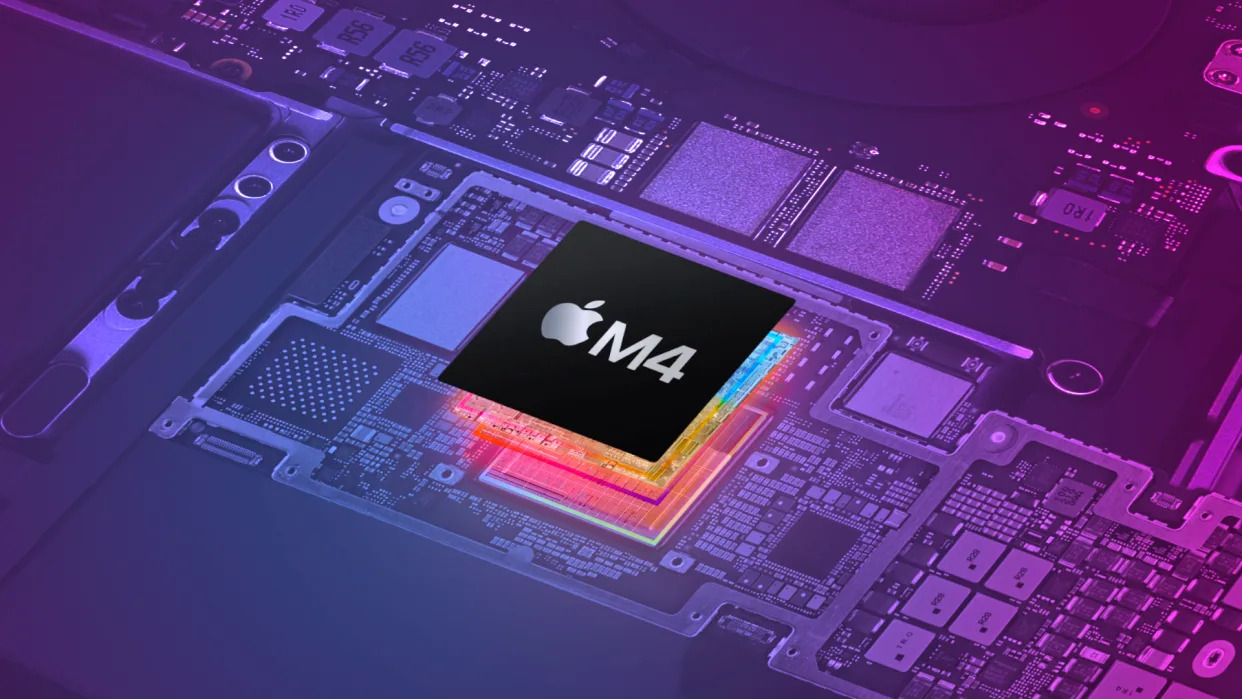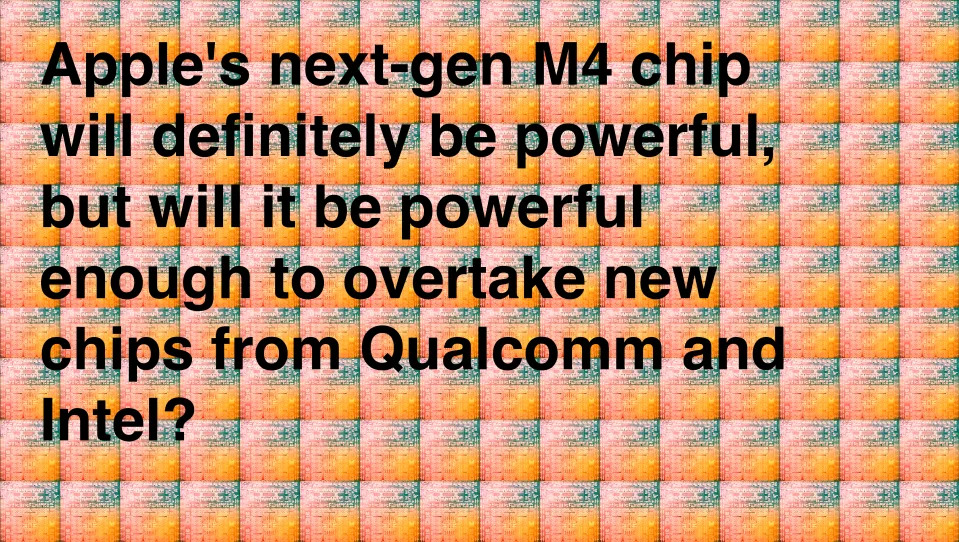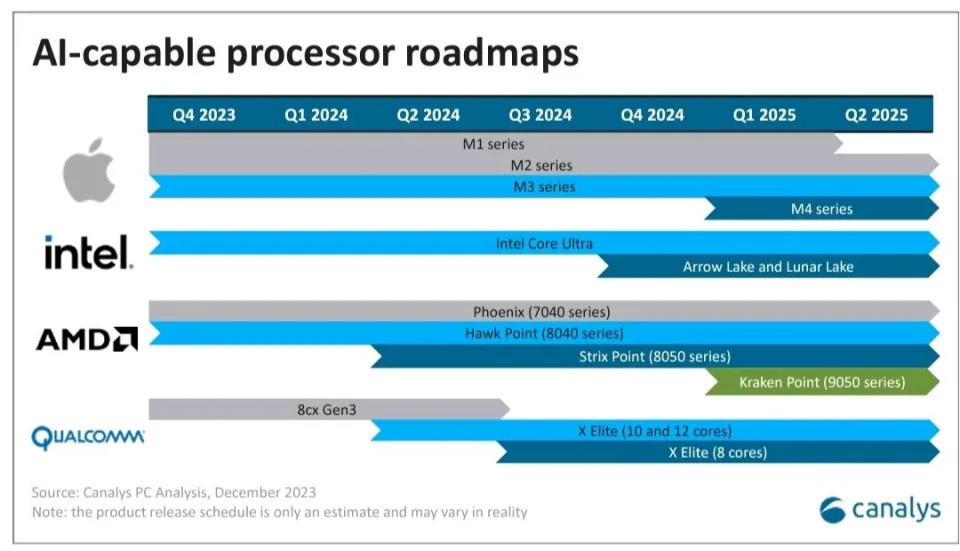
Photo illustration of Apple M4 chip colorfully springing to life from the control board of a MacBook Pro.
Rumors about Apple's M4 chip are all the rage right now, with the latest claiming that we might see the M4 chip debut in the new iPad Pro at Apple's "Let Loose" event on May 7. That rumor may be a bit far-fetched, but there's a high chance we'll see the M4 chip debut this year.
Bloomberg's Mark Gurman, a reliable reporter on all things Apple, provides a lot of information about the M4 chip lineup. Some of these rumors may be confirmed or denied at WWDC 2024, but for now, here's what we know about the M4 chip from Apple, from its possible release date and price to its potential variants, specs, and AI features.
Apple M4 chip: Release date and price
Thanks to Bloomberg's Mark Gurman, we have a timeline for M4 MacBooks. Gurman thinks that Apple will debut its first M4 Macs by the end of 2024—potentially in October or November. The first devices with the M4 treatment might be a low-end 14-inch MacBook Pro and a 24-inch iMac.A high-end MacBook Pro with an M4 Pro or Max chip and an M4-powered Mac Mini may also be released in late 2024 or possibly early 2025. The rest of Apple's computer lineup will receive an M4 upgrade throughout 2025, even if they're only sporting an M2 chip right now.

It's worth noting that Gurman also recently speculated that an AI-powered M4 iPad Pro could launch as soon as May 7, 2024. He said there's a "strong possibility" that these new iPads will sport the M4 instead of the M3. That said, a fall 2024 launch for M4 chips seems more likely.
Regarding price, there aren't many rumors on how much Apple will raise costs, if any, with the M4 chip. The starting price for Apple's MacBook Pro 14 (M3, 2023) is $1,599, and the MacBook Pro 16-inch (M3, 2023) is $2,499. The MacBook Pro 16 has stayed at that $2,499 starting price for the past three generations, and there's no reason to suspect its M4 version will cost any more.
Apple M4 chip: Possible variants
Right now, there are only rumors about three primary variants of the M4 chip: the standard M4 (codenamed Donan), the more powerful M4 Pro (Brava), and the ultimate performing M4 Max (Hidra).According to Bloomberg, the low-end MacBook Pro, new MacBook Airs, and a low-end Mac mini will likely be equipped with the bare M4 chip. High-end MacBook Pros and a "pricier" Mac mini should sport the M4 Pro, and the M4 Max may be reserved for the new Mac Pro.
Apple M4 chip: Specs
Apple's M4 chip is a bit of a mystery despite its possible release later this year. A few leaks have suggested that the M4 may be built using 2-nanometer process technology, which would mean incredible boosts in performance, but other leaks seem to think the M4 chip will stick with the same 3-nm process as the M3.
MacBook Pro 16-inch (M2 Max, 2023) review: The baddest MacBook in the land
Even though M4 chips are supposedly nearing production, there haven't been any leaked Geekbench results to gauge its performance. If the M4 chip offers the same upgrade trajectory we saw from the M2 chip to the M3 chip, we can estimate that its Geekbench score should be just over 15,000.
A score like that would beat the Snapdragon X Elite prototype's highest results by about 23%, giving Apple the hypothetical edge in the M4 vs Snapdragon X Elite battle.
Aside from noticeable performance improvements, we don't know much about the M4 chip's makeup. However, Gurman thinks that Apple might increase the upper memory limit for desktop Macs with the M4 chip, but it's not yet clear whether MacBook Pros will get a memory boost.
Apple M4 chip: AI features
2024 is the year Apple finally got into the AI game, and the M4 chip will undoubtedly power some snazzy new AI features. While the company's M-series chips have always sported a Neural Engine, the M4 chip might be the first to utilize its AI capabilities fully.
Canalys roadmap image showing the anticipated release date for Apple, Intel, AMD, and Qualcomm chips through 2025
According to Mark Gurman, Apple "plans to add new artificial intelligence features across its products," with most of these features running on-device rather than via cloud servers.
Apple will likely debut many AI features for macOS 15 at WWDC 2024. While we won't get to see the features in action on an M4 chip, we could get a teaser of how AI features could improve with more powerful hardware.
Outlook
There's still a lot we don't know about the M4 chip — namely performance benchmark results — but given the history of Apple's silicon chips, it's bound to boast impressive upgrades over the M3 lineup.While there was a year and a half between the M2 and M3 launch (and the M2 and M1 launch), all the rumors point to a fall 2024 launch for Apple's first M4-powered devices, only one year after the M3's release date. Considering how much AI PCs have grown in popularity and how impressive initial benchmarks are for Qualcomm's and Intel's new chips, it's not strange that Apple would want to release M4 chips soon.
Of course, these are all just rumors until Apple confirms or denies information, so take everything with a healthy dose of salt. Past WWDC 2024 (which kicks off June 10, 2024), we might get some definitive information about Apple's next-gen Macs and the M4 chip.

Apple M4 chip rumors: Everything you need to know
Apple's next-gen M4 chip will definitely be powerful, but will it be powerful enough to overtake new chips from Qualcomm and Intel?

